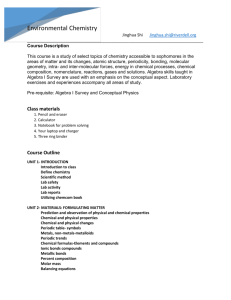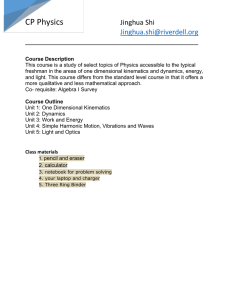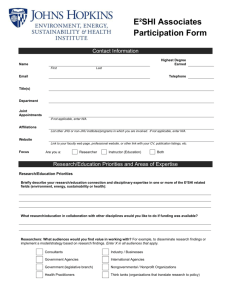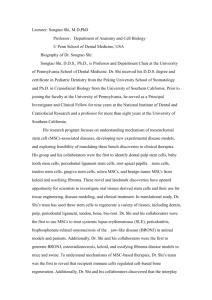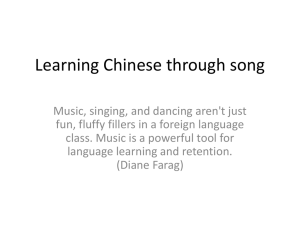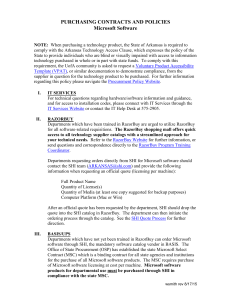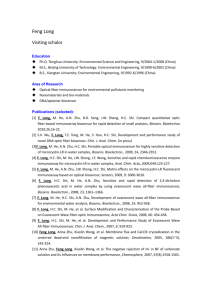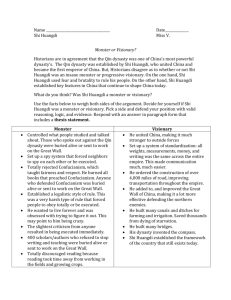syllabus - River Dell Regional School District
advertisement
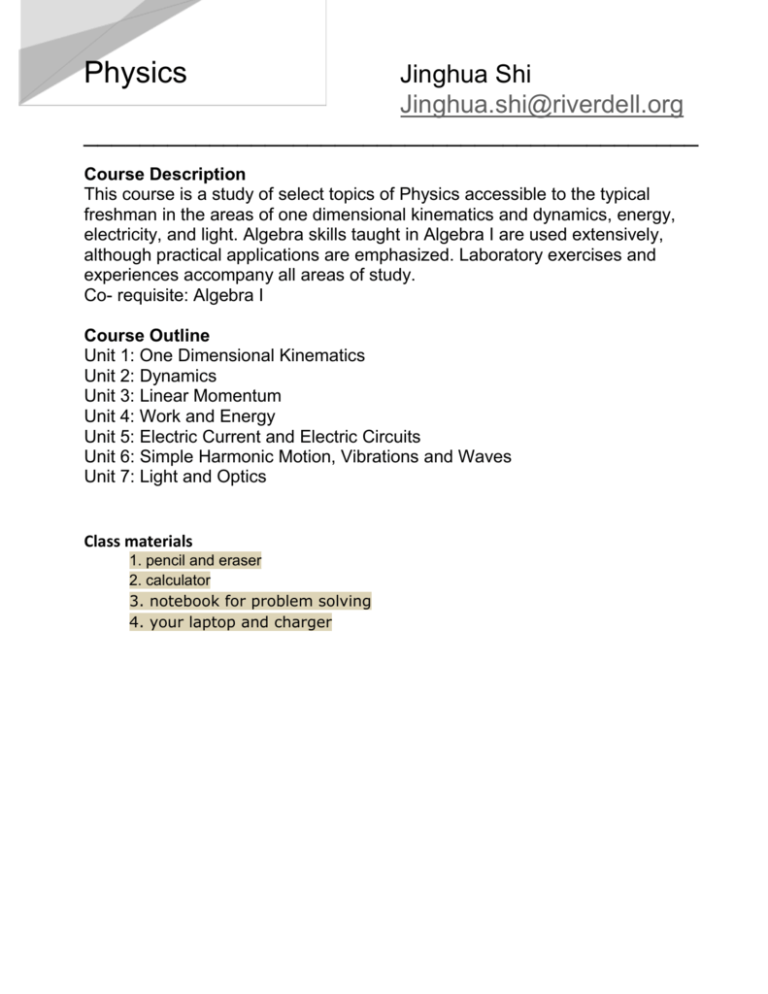
Physics Jinghua Shi Jinghua.shi@riverdell.org ____________________________________________ Course Description This course is a study of select topics of Physics accessible to the typical freshman in the areas of one dimensional kinematics and dynamics, energy, electricity, and light. Algebra skills taught in Algebra I are used extensively, although practical applications are emphasized. Laboratory exercises and experiences accompany all areas of study. Co- requisite: Algebra I Course Outline Unit 1: One Dimensional Kinematics Unit 2: Dynamics Unit 3: Linear Momentum Unit 4: Work and Energy Unit 5: Electric Current and Electric Circuits Unit 6: Simple Harmonic Motion, Vibrations and Waves Unit 7: Light and Optics Class materials 1. pencil and eraser 2. calculator 3. notebook for problem solving 4. your laptop and charger Physics Jinghua Shi Jinghua.shi@riverdell.org ____________________________________________ 1. One- Dimensional Kinematics a. Fundamental and derived units of measurement b. Motion in one dimension c. One dimensional vectors vs. scalars d. Displacement vs. Distance e. Velocity vs. Speed f. Acceleration g. Using the four kinematics equations to solve problems: * a. x = xo +vot + ½ at2 b. v = vo + at c. v2 = vo2 +2ax d. vavg = (v + vo)/2 h. Free fall motion i. Graphical interpretation of motion 2. Dynamics a. Forces b. Newton’s Laws c. Free body Diagrams d. Gravity near the earth’s surface and “g” e. Mass versus weight (W = mg) f. Use ΣF = ma and free body diagrams to solve problems in one dimension g. Surface Forces: Normal Force and Friction h. Static and Kinetic Friction 3. Linear Momentum* a. Momentum (p = mv) b. Impulse (I = Ft = p) c. Momentum and its relation to force (F = p/t) d. Conservation of momentum (p = p’) e. Collision and Impulse Problems f. Perfectly inelastic collisions in one dimension (m’ = m1 + m2) g. Inelastic collisions in one dimension 4. Work and Energy a. Work done by a constant force (W = Fdparallel) b. Kinetic Energy (KE = ½ mv2) c. Gravitational Potential Energy (GPE = mgh) d. Conservation of Energy (Eo + W = E) e. Conservative and non-conservative forces f. Bar diagrams g. Problem solving with the Principle of Conservation of Energ Physics Jinghua Shi Jinghua.shi@riverdell.org __________________________________________ 5. Electric Currents and DC Circuits* a. The electric battery b. Electric current (I = q/t) c. Ohm’s Law (I = V/R) d. Resistivity R = L/A e. Joule’s Law and Electric Power (P=V2/R = IV = I2R) f. Resistors in series (Rseries = R1 + R2 +...) g. Adding resistors in parallel (1/Rparallel = 1/R1 + 1/R2 +...) h. Equivalent Circuit resistance 6. Simple Harmonic Motion; Vibrations; and Waves a. Period and frequency b. Mass-spring systems c. The simple pendulum d. Wave Motion e. Wavelength, frequency and wave velocity f. Interference g. Refraction h. Diffraction i. Standing Waves 7. Light and Optics a. The Wave Nature of Light b. Visible Spectrum c. Reflection and Refraction d. Mirrors, Lenses and Images e. The Electromagnetic Spectrum f. Interference, Diffraction and Polarization g. Photons Physics Jinghua Shi Jinghua.shi@riverdell.org __________________________________________ Class Policy Demonstrate Respect for yourself, your classmates, and your teachers. Be proud of what other people think of you Come to class on time. If you are late, you will be marked as tardiness. Being 3 times tardiness will effect participation. To be prepared for each class. Bring pencils, calculator, notebook, and your laptop with charger. Work well with classmates especially during Lab activity. Follow all safety guidelines. Make sure you clean up after yourselves. Participation will be monitored. It is an important factor in performing well in the course. Every Student will start with 100 as participation grade and have deduction for tardiness, misconduct, and not having required supplies for the class, etc. Class participation grades will be reduced for inappropriate behaviors, and misconduct. NOT receive or make phone calls or text messages during class time. MUST TURN OFF all cell phones and other electronic devices (iPods, MP3s, etc.) before entering the classroom. Being 3 times violation will effect participation. Please check at the white board or overhead projector for Do Now assignment after entering the classroom and start on it promptly. NEVER leave class room without permission. Make sure to sign in and out of the room. You are responsible for any work missed. The number of days to make up missing work is equal to the number of your absent days. But if you are absent for one day, all work is to be made up on the day you return to school. Physics Jinghua Shi Jinghua.shi@riverdell.org __________________________________________ Grading policy Homework and quizzes: 25% Homework will be assigned on a regular basis. It may or may not be checked. Homework is designed to give you opportunities to practice and review class content. If you find you are having difficulties completing your homework, it may be an indication you need extra help. Frequent quizzes will be given. For problem solving questions, all work must be shown for full credit. Lab and Activities Work: 25% Lab work will be any assignment associated with a lab exercise; however, worksheets, projects or oral presentations may also be part of the lab grade. Instructions for each lab assignment will be given at the time of the lab. Some students may need extra time to complete assignments beyond the time provided in class. You may choose to finish work, if needed, at home or during extra help. Tests: 50% Written tests will be given every three or four weeks (approximately). They may be composed of true/false, multiple choice, fill-ins, matching, essay questions or word problems. Late Work I expect all work to be submitted on time; however, the following policy will apply to all work turned in after the due date: If the work is reviewed during class or returned graded, late work will not be accepted. If work is not reviewed, assignments such as papers, labs, projects that are turned in late will receive a 10 point per day deduction up to a maximum of 4 days Copying, Cheating, Plagiarism Students found copying, cheating, plagiarizing or working with other students without permission will be reported to the Principal and/or Assistant Principal. Giving your work to another student to look at is considered cheating. Working in groups without permission is considered cheating. (Helping a friend with their work means that you explain the concepts to them and “teach” them how to arrive at answers.) In all cases of cheating, parents will be notified immediately. Physics Jinghua Shi Jinghua.shi@riverdell.org __________________________________________ Extra help I am available during lunch and after school 2:35pm-3:05pm by appointment in science office. Please check school wire for homework information and students grade report, and send me email for any questions and concerns.
